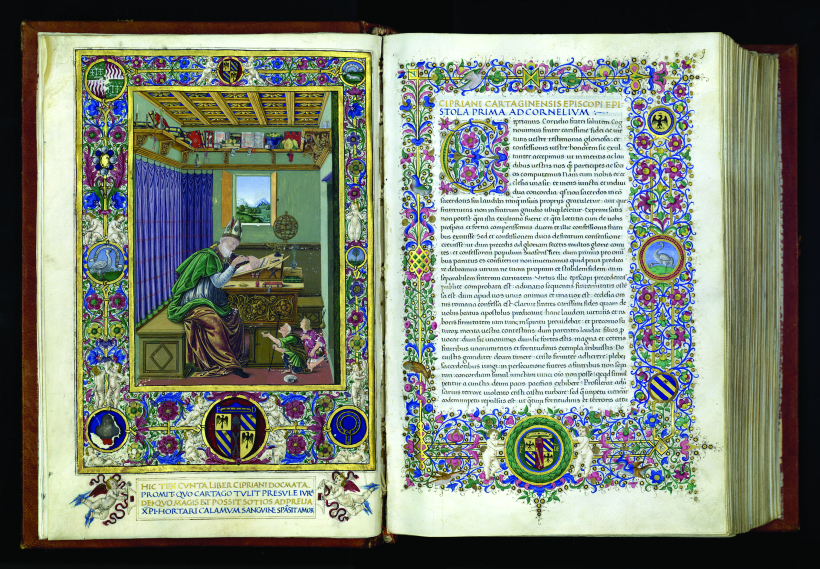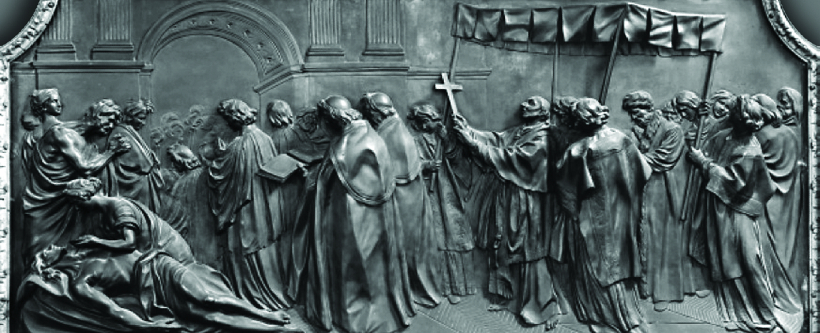
“The Compassion,” by William-Adolphe Bouguereau, 1897
…except when it is an expression of love. Then it can sanctify, not destroy us
If there is one thing we all dread, it is suffering. A newborn baby will already respond with screams to any discomfort. Many human beings spend much of their lives trying not only to avoid suffering, but to pursue enjoyment. How many crimes, how many abominations, can be explained by this craving? It is a topic that truly deserves our attention.
Anyone who has carefully read the autobiography of St. Therese of Lisieux will be challenged to re-read it many times, for it is a golden source of insights on our topic: how to be crucified with a smile.
One thing, while obvious, is nevertheless often overlooked. We are responsible for many of our own sufferings. St. Therese only alludes to this topic, telling us that early in her religious life, she often worried about problems which, when she was spiritually more mature, struck her as not worth being concerned with. Is there anyone among my readers who will not acknowledge that he or she has wasted much energy over petty things not worth being concerned with?
But, like leaks, or tiny tears in a tire — apparently insignificant — they can have disastrous consequences. One great aim in the spiritual life is to wage a merciless war on self-manufactured sufferings which weaken us to such an extent that our moral resistance is “deflated” from the start.
The gamut of possibility is large indeed. When told that we shall have to undergo a minor, but painful, surgical intervention (such as a dental problem), some will suffer even before it takes place — imaging what they shall have to go through. Then they will inevitably suffer while the procedure is taking place, and then suffer for the third time by reliving the operation. How tempting to tell others in a dramatic way, how much one has suffered, hinting at the fact that one’s interlocutor cannot conceive what suffering is. I alone know…
A pregnant woman can suffer psychological tortures in imagining the pains of childbirth the very moment that she becomes aware that she is with child (how can it possibly be that a big baby will ever come out of my body without tearing it apart? — forgetting that it has taken place millions and millions of times since original sin). Inevitably she will suffer while delivering her child, and after a successful birth will find a keen satisfaction in reliving this traumatic experience, while ignoring the joy she experienced in bringing a child into the world.
The Bible is eloquent on this topic: when Eve gave birth to Cain she exclaimed, “With God’s help, I have brought a man into the world.” Not a word about her anguish. Worth mentioning is her “pride” and her joyful awareness that this amazing event has taken place “thanks to God.” Adam is not even mentioned, for if his role in fecundating her womb was crucial, it also was very modest: for the fecundated egg only becomes a human person when God himself, having “touched” the female body, put a soul into it. This explains why there is something “sacred” about woman’s body; for whatever is touched by God, has a note of sacredness that calls for “veiling.” Eve does not allude to the pains that she has undergone: her joy has erased them from her consciousness: the beauty of motherhood more than compensates for it.
We all know people who pride themselves at being “experts in suffering.” As soon as we see them, we can prophesy that they will tell us all the trials they have gone through since we saw them last. If one mentions that one has gone through similar painful experiences, they are likely to exclaim: “This is possibly true, but your experiences cannot match mine. I have an extreme sensitivity that makes me feel pain doubly.”
We all know “martyr children” sincerely convinced that they are less loved, that they are deprived and unjustly treated. Their siblings are always favored, and even though “they never complain,” they suffer doubly. There are those who suffer from potential pains. Told about someone who is dying of a painful cancer, they imagine themselves in a similar condition, and actually suffer as if they were victims of this painful disease.

“Madonna del Parto” (Madonna of Childbirth), from the Church of San Lorenzo in Montefiesole, Florence
There are people living in favorable circumstances who fall into depression at the thought that one day, maybe in the near future, they might find themselves penniless. Their suffering, while “real” — for they truly torture themselves — has something ludicrous, as being very old and having several possessions, they have no objective reason to worry about starving tomorrow. On the other hand, there are those who do not know what tomorrow will bring them, having nothing, and keep repeating the words of Abraham: Deus providebit. They have faith, and firmly believe that if they had to face starvation, God would give them the grace to echo Job: “God has given; God has taken away: blessed be His holy name.”
A long chapter should be dedicated to the “sufferings” endured by those whose vanity has been offended: girls who fall into depression because, after having expected to be the “queen of the ball,” a “rival” was clearly the winner. I recall an elderly Spanish lady telling me that the “worst day of her life” was after expecting, at her debut, to draw all of the young men’s attention to her dress and a magnificent piece of jewelry she had inherited from her grandmother, she had to acknowledge that a “friend” had “won the contest.” She told me, “All of a sudden, all the lights ‘dimmed,’ the music became discordant: I was in total darkness. It was the worst day of my life.” Indeed, I found it difficult to feel “compassion,” yet there is no doubt that her “suffering” was real.
There are those falling into depression because while assuming that their hairdo or their new dress would receive innumerable compliments, had to acknowledge to their profound grief, no one remarked how stunning they looked, despite having spent hours in front of a mirror to add a touch of red here, a touch of black there, and painting their nails in green (which has now apparently become fashionable).
But vanity is wrongly assumed to be an exclusive female prerogative: males can match them, even though their “sensitivity” is mostly directed toward their intellectual achievements: the sharpness of their minds, their “scholarship,” their wit, their eloquence. How “painful” not to be officially acknowledged to be the best speaker! How dull people are not to “see” that their performance was by far the best. Those whose life is spent teaching at a university, must necessarily be aware of the sufferings that some professors go through because their genius is not acknowledged by their colleagues. I recall one “big shot” being asked about the performance of one of his rivals and exclaiming: “How can one praise so-and-so for having delivered a brilliant lecture — in fact, in half of it [i.e., the good part] he plagiarized from me… while the second part was junk!” (This is an actual quote.) Are not these “injustices” (mostly caused by human stupidity) legitimate sources of suffering?
No doubt some people are crushed by such “trials.”
There is also no doubt that a majority of men and women suffer from self-manufactured sufferings: but such crosses are crushing because we cannot possibly expect that “divine compassion” and grace will come to our aid.
Wounded vanity, wounded pride, deflated ambition do cause great “sufferings” to many of Eve’s sons and daughters, but the question that should be raised is: are these sufferings necessary? The holier a person is (that is, the more humble), the more such dark clouds will be eliminated, and this explains why, having waged war on imaginary or unnecessary burdens, they have the strength, with God’s grace, to carry the real and at times very heavy crosses that God sends His loved ones. We must trust that for such, He will give us the graces necessary to embrace the cross, but we cannot expect a single ounce of grace for those that we have self-manufactured.
Apart from wounded pride caused by ambition and “the green-eyed monster,” jealousy, a rich source of self-made suffering is self-pity: “Nobody knows, nobody can possibly know, what I suffer… Others do not, cannot know what suffering truly is.”
As soon as a person starts crying over his sufferings, he is already defeated — and this also renders him incapable to being compassionate toward the sufferings of others. French cynicism put it well: “It is remarkable how light other people’s crosses are” — intimating that only our own are truly “unbearable.” Alas, the tendency is in us to inflate our sufferings and dwarf those of others, thereby liberating us from the “duty” and burden of compassion.
How very different is the attitude of saints who, while never complaining about their crosses, always generously help carry those of others.
There are mothers who torture themselves at the thought of all the temptations that their sons (and we might add today, their daughters) will be exposed to when they go “into the world,” while failing to turn to Christ and His Holy Mother for help. These mothers should know that Our Lord and His Mother love their child more than they possibly can, and the safest thing is to beg them to protect him or her.
There are “visible” sufferings: most of them are related to “Brother Ass” who, on this earth, can be a very unpleasant companion. St. Teresa of Avila, writing her autobiography under obedience, does mention that soon after she entered the convent, to the very end of her life, her body was her deadly enemy — in other words, that she was in constant pain or discomfort, rarely having a moment of respite. Not a word of complaint escaped from her lips or her pen: she viewed suffering as a grace, allowing her to join Christ on the cross. Is it conceivable that one would pursue enjoyment while “loving” a crucified Savior? To be a great mystic calls for a price: to join Christ on the cross.
Most physical sufferings, while not felt by others, can often be perceived by them: difficulty in walking, in eating, in bending, in breathing, in talking. But physical sufferings — hard as they are to bear — are, I believe, not the worst. There are psychological and spiritual sufferings which are not perceived by others, but are a daily crucifixion. I mentioned the Story of a Soul of the Little Flower: she never expected that her memoirs, describing the inner sufferings that she endured throughout her convent life while having a winning smile on her lovely face, would be read by millions and millions of people. (When she died, a nun commented that she truly had done nothing remarkable; someone radiating such peace is someone whose religious life is, seemingly, a bed of roses! But one thing is now obvious: from the very day she entered the Carmel until her death some nine years later, she followed Christ from Gethsemane to Calvary, and never opened her mouth. There is not a single word of complaint…or presenting herself as a martyr. Her secret was “never to want anything except what Christ wanted from her.”)
But once again, writing under obedience, she shared with her readers these beautiful, golden words: “I have never been able to do anything alone.” These are the two keys that explain why, at the age of 24, she reached a degree of holiness which many of us cannot hope ever to reach, were we to live for hundreds of years. Suffering was her “secret of love.” It was the jewel she offered to Him whom she ardently loved, even as a child. What is one to give to Him who was crucified and died for us, except to join Him?
The saints — true children of the Church — have taught us the secret of suffering. First of all, they never allow themselves to be the victims of any type of self-made suffering. The moment such temptations arise, they are mercilessly nipped in the bud: they are properly diagnosed as products of self-centeredness and a sickly adulation of the “self.”
Moreover, the saints teach us that one way of lightening one’s suffering is to help others carry their crosses. It was, I believe, Père Jean d’Elbee who, in his admirable little book I Believe in Love, taught us that remedy. The less self-centered one is, the more one turns lovingly to others and the lighter one’s own crosses will be. How very different from those unhappy people who pride themselves on being the greatest sufferers and who, when told about the pains of others, spontaneously exclaim, as already mentioned, that those pains cannot possibly be compared to what “I myself have endured.”
We now come to the very heart of our question: the message of Christianity. Let us briefly mention that the “genius” of the Buddha is to have taught his disciples to escape from suffering. “He who has one hundred loves, has one hundred sufferings; he who has fifty, has fifty sufferings; he who has one has but one suffering. He who has none is liberated from suffering.” One then vanishes into a mysterious “nothing” which is a supposed key to peace.
Tempting as it might be to some people to eliminate suffering by this method, it should be obvious that it amounts to metaphysical and affective annihilation. He who has no heart is not a human person: the alternatives are nothingness or love.
This is the very essence of Christianity: a God who is Love itself, choosing suffering to redeem His wayward and rebellious children, bound to perdition; He freely chose it in willingly shedding His blood to reopen for us the gates of Heaven. Is it conceivable that he who has meditated on the holy madness of Divine Love for His creatures, refuses to have his heart wounded by the same wound, and to understand that to suffer should be an expression of love?
Not surprisingly, plenty of people will declare themselves willing to share their pleasures and enjoyments. But he who is willing to suffer with you, he and he alone deserves to be called a lover. “There is no greater love than to give one’s life for one’s friends.”
To understand that there is a divine bond between suffering and love, is the secret of Christianity. May he who has ears to hear, understand this message: kiss the cross, or be crushed by the cross.







Facebook Comments